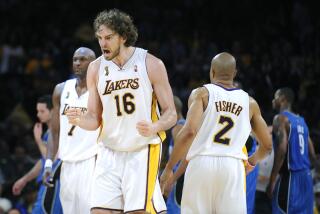Ex-Celtic Parish Ends His Career After 21 Years
- Share via
Red Auerbach didn’t know how good a player he was getting when he traded for Robert Parish in one of basketball’s most lopsided deals.
And now, 17 years later, it’s doubtful fans fully appreciate the achievements of the stoical center who shunned the spotlight throughout the longest playing career in NBA history.
Larry Bird and Kevin McHale got the publicity on the Boston Celtics. Yet the three championships they won in the 1980s might not have been possible without the 7-foot-1 Parish, the biggest part of the Big Three frontcourt.
“He was always the third man to get shots behind Larry and Kevin and he never raised a fuss,” says K.C. Jones, who coached them to titles in 1984 and 1986. “I asked him about that one time and he said, ‘As long as we win, it’s no problem.”’
Night after night, year after year, the dependable Parish was the anchor of one of the NBA’s greatest teams. He ran the pick-and-roll with precision, defended with passion, lofted unstoppable jumpers and slammed down breakaway dunks.
Now all that is in the past.
After 21 seasons, an NBA record 1,611 games, nine All-Star appearances and selection as one of the top 50 players in history, Parish announced his retirement recently in his typical understated way. No gala news conference. Just a matter-of-fact statement in an ESPN interview five days before his 44th birthday.
“I exceeded my expectations of longevity in the NBA,” he said. “I told myself coming into the league that if I could play for six or seven years, that would have been a great career. . . .
“No one knows better than the person when to retire. So I know in my heart it’s time to walk away.”
Parish, rarely injured and always in shape with a regimen that included yoga, began his pro career with four solid seasons with Golden State. He ended it with three seasons as a backup, two with Charlotte and one with Chicago, where he won his fourth title last season but appeared in just two playoff games.
The greatness occurred in between.
“He’s done about everything he could possibly do,” Bird says. “He was so easy to play with. He was a very unselfish guy and he did whatever it took for your team to win.”
The day before the 1980 draft, Auerbach, then Boston’s general manager, made his move. He sent the first and 13th picks to the mediocre Warriors for Parish and the No. 3 pick overall.
The Warriors chose Joe Barry Carroll and Rickey Brown. Carroll lasted 10 seasons, mostly with Golden State, averaging 17.7 points a game. Brown was out of the league after five so-so seasons.
The Celtics drafted McHale.
“If I said I knew how good he (Parish) would be, I’d be lying,” Auerbach says. “What I did see was a guy that just kept his mouth shut and played hard.
“There was nothing spectacular about his game. But you knew what you got out there, and you’re going to get it every night.”
In the Big Three’s first season, the Celtics won the championship. They did it again three years later and two years after that. Parish was just as steady: In the first 12 of his 14 seasons with Boston, his field goal percentage ranged between .535 and .598 and his scoring average held between 14.1 and 19.9 points.
“He was probably the best middle-range jump shooter for a big man in the history of the game,” says Bill Walton, Parish’s backup when the Celtics won their last title in 1986. “What defines Robert Parish is his consistency. Chief was an absolutely terrific teammate who never got the recognition he deserved.”
Parish got that nickname from Boston teammate Cedric Maxwell, who saw in his stone-faced, distinguished manner a similarity to the American Indian character from the film “One Flew Over The Cuckoo’s Nest.”
But there was a side of Parish the public rarely saw.
“Away from the game, he was just a ball of fire,” Walton says, “always playing practical jokes on the team bus.”
Adds Auerbach: “He didn’t say much but he had a dry sense of humor and when you finally got him to talk he was pretty clever.”
He cleverly--and quietly--would slip out of the locker room when reporters descended on the quotable Bird and McHale for post-game interviews.
Yet in his final season with Boston--1993-94, after Bird and McHale had retired--he was witty and available after games as the team’s elder statesman.
He also departed from his emotionally detached image when he punched Detroit’s Bill Laimbeer during the 1987 playoffs after a tussle under the basket. It cost Parish a $7,500 fine and a one-game suspension.
Later on, his ex-wife claimed he had abused her. Those were uncomfortable moments of notoriety for Parish. On the court, off the court and in the locker room, he guarded his privacy as if he were defending the basket.
He even kept his plan to retire quiet. He told Jones about it last month over lunch in a suburban Boston restaurant, then waited nearly six weeks to announce it.
“He said he just had enough,” Jones recalls.
For 14 years, Parish gave the Celtics and their fans much more than enough.
“He just came every day with a big smile on his face and gave his best,” Walton says. “You don’t win championships unless you’ve got guys like Robert Parish.”
More to Read
Go beyond the scoreboard
Get the latest on L.A.'s teams in the daily Sports Report newsletter.
You may occasionally receive promotional content from the Los Angeles Times.









